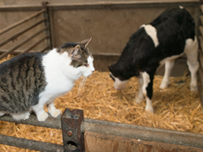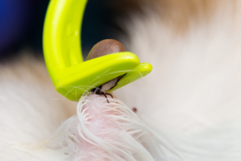Obesity. A big, fat problem. - Dr. Sophie Bell
Dr. Sophie Bell shares the risks of obesity and how to keep on top of your dog's weight.
Read morePublished: 6 September 2023
Q fever, not one you may have heard of, Coxiella burnetii is the bacteria behind this disease, which affects a range of animals including our dogs and cats. It is a zoonotic disease that can spread to humans, which is why hygiene around our pets is extremely important.
In the U.K. this disease is rarely diagnosed in dogs and cats and mainly affects cattle for which it can cause abortions. Both sheep and goats can also be affected. The bacteria are very resistant and can live in the environment for months. Currently in the UK there is no vaccine available, however the number of dogs, cats, and humans affected are very low.
 Cats can contract Q fever from infected farm animals, either by inhaling the bacteria or eating meat from a contaminated carcass. This would be more relevant for rural cats who are at a higher risk, although because they can often be asymptomatic, it can be difficult to know they have become infected.
Cats can contract Q fever from infected farm animals, either by inhaling the bacteria or eating meat from a contaminated carcass. This would be more relevant for rural cats who are at a higher risk, although because they can often be asymptomatic, it can be difficult to know they have become infected.
Q fever can also be transmitted by ticks, but again this is uncommon in the UK. Can you remove a tick?
Get a tick remover in you pet first-aid kit!
Use this forked tool by popping it around the tick’s head area, then twist clockwise or anticlockwise.
You can purchase from your vet preventative tick medication to stop them biting your cat.
Many animals are asymptomatic, meaning that they carry the bacteria but do not show any clinical signs. These animals can be difficult to identify.

Symptoms are often vague making a diagnosis difficult.
Did you know? The normal temperature range for a cat is from 37.5-39.2ºC. They often feel warm to the touch as they have a naturally higher body temperature than us. Therefore, touch alone is not a way to diagnose if your pet has a fever.
Q fever is difficult to diagnose, your vet is likely to carry out a series of blood tests and take a full history. Access to farm animals is an important part of the clinical history.
Antibiotics are the treatment of choice, usually a two week course of doxycycline. A hospital stay is not always the case, but for cats who are anorexic this could occur. A feeding tube may need to be placed until they are eating by themselves. Diagnostic work alone can be expensive, but much needed before treatment is commenced.
Although a relatively uncommon disease, it is one to be aware of, especially if you live in a rural setting. Those who are immunocompromised including pregnant women must be particularly careful and stay away from infected animals. Q fever can cause abortions in pregnant woman. Hygiene is always important as there are several zoonotic diseases. There is no need to worry but always to be cautious.